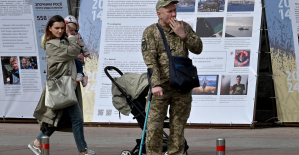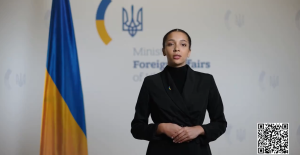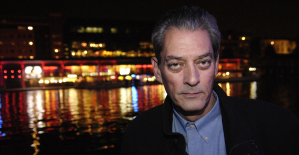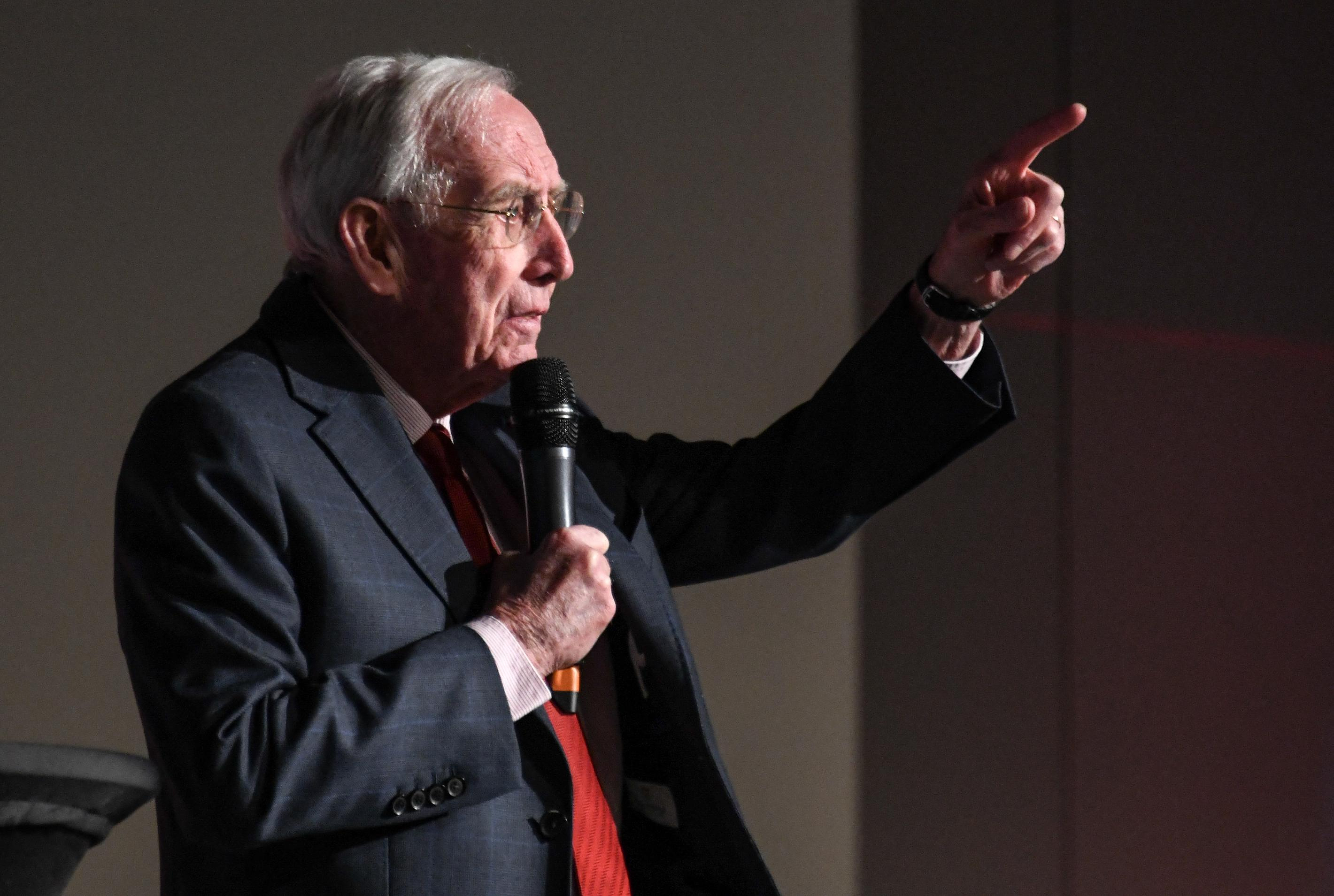One mimes the fractures collected in prison, the other collapses while recounting his capitulation, a third finds the automatisms of his tiny solitary cell... The director Mehran Tamadon makes ex-prisoners relive their tortures Iranians to, he hopes, "shake" their executioners. Several scenes from Where God Is Not, which has not yet been released in theaters but has been selected for the 2023 Berlinale, twist the stomach. Physical suffering, however, is only suggested visually. But the psychological springs of torture dissected by three victims border on the unspeakable.
Their ordeals largely predate the last protest movement, which started in mid-September and during which at least 537 people were killed by Iranian security forces, according to the NGO Iran human rights, and thousands of others imprisoned. But "everything I film speaks of today" because "at this hour, there are people who are being tortured in prisons in Iran", observes Mehran Tamadon, born in Tehran in 1972 to communist parents, whose father was imprisoned under the Shah of Iran and whose mother fled to France in 1984 with her children. "It's been 43 years", since the 1979 revolution that overthrew the shah, that this "totalitarian system" has lasted which "does not ask for forgiveness", told AFP the architect by training, who became a director while he was living in the 2000s in Iran.
After his documentary Bassidji, in which he interacted with members of this very feared paramilitary militia, the concept of his Iranian film, which showed him conversing with four mullahs, displeased the authorities so much that his Iranian and French passports were withdrawn from him for a time. Then returned at the end of 2012.
He then definitively left the Islamic Republic of Iran, whose violence is, according to him, "internalized" by everyone, a brutality that works "like Russian roulette" and "which can fall", in a "random" way, on everyone. Witness Mazyar, 50, a former business leader accused of murder, who manufactures in Where God Is Not a torture bed similar to the one he was tied to, where bones of his feet were broken. with a metal cable. Then he tells how, unable to walk, he was forced to confess in front of a camera of crimes he had not committed.
Homa narrates the overcrowded prisons of the 1980s, the beatings, the insults. She bursts into tears when she remembers the day when, "too weak", "powerless", she was "broken" by religious propaganda and began to pray, turning her back on the Marxism she claimed.
Taghi Rahmani, who was imprisoned for fifteen years for his political activity, relives isolation, filmed in a very small Parisian cellar. “I spent six months like that. One, two, three steps,” recalls the sixty-year-old, walking from wall to wall. “Mehran takes risks in bringing trauma to life (for the victims), but you understand what it feels like to be tortured. It does not cross borders, when it would become obscene,” observes Cristina Nord, a Berlinale executive.
Besides Where God Is Not, Mehran Tamadon also released a second film, My Worst Enemy, in which he himself becomes a victim of mental torture. His executioner: actress Zar Amir Ebrahimi, who fled Iran in 2008 after months of interrogation and humiliation. “I enjoyed destroying you with the words I said to you”, confides towards the end of the film this winner of the prize for female interpretation at the last Cannes festival, without the spectator understanding if she is following a script, or if she confides. The director claims this effect of "abyss", intended according to him to "shake" the executioners. “A lot of the questions I ask my characters about the conscience of the executioner are directed at them directly. (…) Maybe all this will sow a seed that will have its effect later”, he hopes.
A “naive” vision, according to Catherine Bizern, the artistic director of Cinéma du réel, a Parisian documentary festival, which had won the award in 2014 for her Iranian film. But this one to rent "complex" films, which go "beyond emotion" and in which the filmmaker "puts himself in danger". Taghi Rahmani also does not believe in the redeeming virtue of the two films. A political activist who took refuge in France more than ten years ago, he thinks more of his wife, the icon of human rights Narges Mohammadi. Detained in Iran, she is one of the figures of the current protest. "As my wife is known, we don't physically torture her," he told AFP. But she's in solitary..." Before continuing: "Every time she suffers, I suffer too."

 Poland, big winner of European enlargement
Poland, big winner of European enlargement In Israel, step-by-step negotiations for a ceasefire in the Gaza Strip
In Israel, step-by-step negotiations for a ceasefire in the Gaza Strip BBVA ADRs fall almost 2% on Wall Street
BBVA ADRs fall almost 2% on Wall Street Ukraine has lost 10 million inhabitants since 2001... and could lose as many by 2050
Ukraine has lost 10 million inhabitants since 2001... and could lose as many by 2050 Sánchez cancels his agenda and considers resigning: "I need to stop and reflect"
Sánchez cancels his agenda and considers resigning: "I need to stop and reflect" The Federal Committee of the PSOE interrupts the event to take to the streets with the militants
The Federal Committee of the PSOE interrupts the event to take to the streets with the militants Repsol: "We want to lead generative AI to guarantee its benefits and avoid risks"
Repsol: "We want to lead generative AI to guarantee its benefits and avoid risks" Osteoarthritis: an innovation to improve its management
Osteoarthritis: an innovation to improve its management Ukraine gets a spokesperson generated by artificial intelligence
Ukraine gets a spokesperson generated by artificial intelligence The French will take advantage of the May bridges to explore France
The French will take advantage of the May bridges to explore France Organic flour contaminated by a recalled toxic plant
Organic flour contaminated by a recalled toxic plant 2024 Olympics: Parisian garbage collectors have filed a strike notice
2024 Olympics: Parisian garbage collectors have filed a strike notice Death of Paul Auster: Actes Sud says he is “lucky” to have been his publisher in France
Death of Paul Auster: Actes Sud says he is “lucky” to have been his publisher in France Lang Lang, the most French of Chinese pianists
Lang Lang, the most French of Chinese pianists Author of the “New York Trilogy”, American novelist Paul Auster has died at the age of 77
Author of the “New York Trilogy”, American novelist Paul Auster has died at the age of 77 To the End of the World, The Stolen Painting, Border Line... Films to watch this week
To the End of the World, The Stolen Painting, Border Line... Films to watch this week Omoda 7, another Chinese car that could be manufactured in Spain
Omoda 7, another Chinese car that could be manufactured in Spain BYD chooses CA Auto Bank as financial partner in Spain
BYD chooses CA Auto Bank as financial partner in Spain Tesla and Baidu sign key agreement to boost development of autonomous driving
Tesla and Baidu sign key agreement to boost development of autonomous driving Skoda Kodiaq 2024: a 'beast' plug-in hybrid SUV
Skoda Kodiaq 2024: a 'beast' plug-in hybrid SUV The home mortgage firm rises 3.8% in February and the average interest moderates to 3.33%
The home mortgage firm rises 3.8% in February and the average interest moderates to 3.33% This is how housing prices have changed in Spain in the last decade
This is how housing prices have changed in Spain in the last decade The home mortgage firm drops 10% in January and interest soars to 3.46%
The home mortgage firm drops 10% in January and interest soars to 3.46% The jewel of the Rocío de Nagüeles urbanization: a dream villa in Marbella
The jewel of the Rocío de Nagüeles urbanization: a dream villa in Marbella Europeans: a senior official on the National Rally list
Europeans: a senior official on the National Rally list Blockade of Sciences Po: the right denounces a “drift”, the government charges the rebels
Blockade of Sciences Po: the right denounces a “drift”, the government charges the rebels Even on a mission for NATO, the Charles-de-Gaulle remains under French control, Lecornu responds to Mélenchon
Even on a mission for NATO, the Charles-de-Gaulle remains under French control, Lecornu responds to Mélenchon “Deadly Europe”, “economic decline”, immigration… What to remember from Emmanuel Macron’s speech at the Sorbonne
“Deadly Europe”, “economic decline”, immigration… What to remember from Emmanuel Macron’s speech at the Sorbonne These French cities that will boycott the World Cup in Qatar
These French cities that will boycott the World Cup in Qatar Top 14: Fijian hooker Narisia leaves Racing 92 and signs for Oyonnax
Top 14: Fijian hooker Narisia leaves Racing 92 and signs for Oyonnax Europa League: Jean-Louis Gasset is “wary” of Atalanta, an “atypical team”
Europa League: Jean-Louis Gasset is “wary” of Atalanta, an “atypical team” Europa League: “I don’t believe it…”, Gasset jokes about Aubameyang’s age
Europa League: “I don’t believe it…”, Gasset jokes about Aubameyang’s age Foot: Rupture of the cruciate ligaments for Sergino Dest (PSV), absent until 2025
Foot: Rupture of the cruciate ligaments for Sergino Dest (PSV), absent until 2025
















